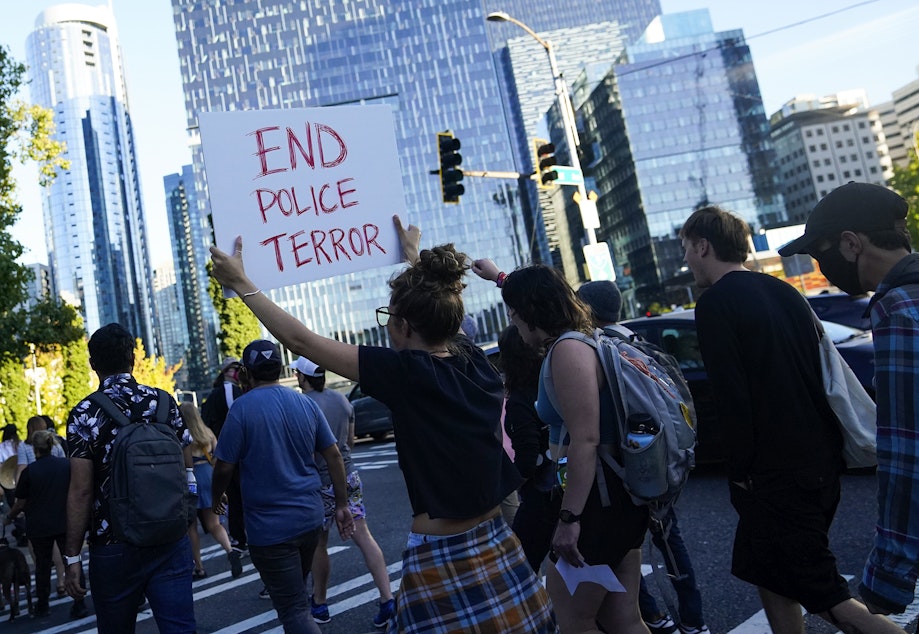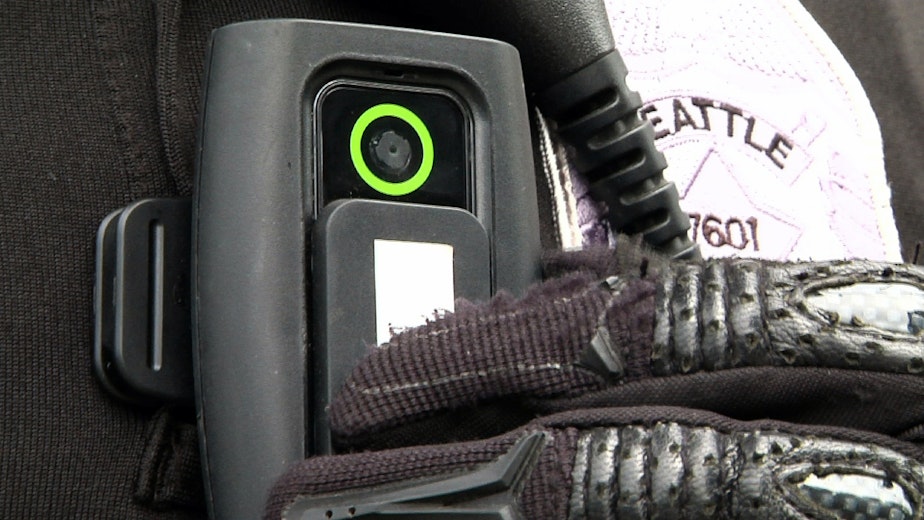Seattle police ended body camera analysis after footage caught officer mocking woman’s death

Editor's note: This story was first published by Open Vallejo, an award winning nonprofit newsroom in California. Support their work by donating here.
Two Seattle police union leaders are under scrutiny after body camera footage caught one of them joking over the death of a young woman killed by a police cruiser.
Now, records obtained by Open Vallejo show that days after the conversation was recorded, one of the union officials implicated in the scandal was involved in canceling a contract for a body camera analysis service that risked flagging the unprofessional comments to higher-ups.
The Vallejo and Seattle police departments are the only law enforcement agencies to have ever terminated their contracts with Truleo, the Chicago-based company behind the software. In both cases, union officials campaigned to stop their department from using the technology after it allegedly risked surfacing problematic officer behavior.
On Jan. 23, Ofc. Daniel Auderer, the vice president of the Seattle Police Officers Guild, was assigned to perform a routine sobriety test on Kevin Dave, the police officer who struck 23-year-old graduate student Jaahnavi Kandula while driving his police car.

Dave was responding to an overdose call and going 74 mph in a 25 mph zone moments before hitting Kandula, according to public records first obtained by PubliCola, an independent newsroom covering Seattle. Body-worn camera footage released last week shows Auderer speaking on the phone with union President Mike Solan after meeting with Dave at Seattle’s West Precinct.
“She is dead,” Auderer is heard saying moments before bursting out laughing at an apparent comment from Solan, who cannot be heard in the video.
“Yeah, just write a check,” Auderer says, laughing again in a back-and-forth with Solan. “Eleven thousand dollars. She was 26 anyway. She had limited value.”
What Auderer did not know was that his body camera video had recorded the conversation, according to a statement he provided to Seattle’s Office of Police Accountability on Aug. 8. Nor was he aware that his comments risked being flagged to department supervisors by Truleo’s software, which is programmed to apply a “risk” label to videos that contain certain words, such as “dead.”
The Seattle Police Department hired Truleo in 2021 to help identify unprofessional conduct by officers using natural language processing. The software transcribes body camera audio and identifies potentially problematic incidents for supervisor review. The company has gained the support of the FBI National Academy Associates and the California Police Chiefs Association.
Records obtained by Open Vallejo show that as of December, the Seattle Police Department intended to renew its Truleo contract for an additional two years. But when Solan learned about the department’s use of Truleo — less than two weeks after his conversation with Auderer about Kandula’s death — the union president confronted Seattle Police Chief Adrian Diaz, Solan told KTTH radio host Jason Rantz.
“I was irate,” Solan said, adding that officers felt they were “spied on” and that the department had allegedly failed to inform officers that the software was being used to analyze their interactions.
The department ended its contract on the same day he personally complained to Diaz, Solan told Rantz.
Auderer and Solan did not respond to requests for comment.
The Seattle Police Department officially canceled its agreement with Truleo on Feb. 7, according to records obtained by this newsroom.
In a statement to Open Vallejo, a spokesperson for the Seattle Police Department said it discontinued its “limited pilot” contract with Truleo “in light of reactions” to news coverage about the agency’s use of the software. The articles highlighted concerns by the ACLU of Washington over civilian privacy. (According to its website, Truleo can automatically redact information that could identify civilians.)
“The technology has a lot of promise,” the department’s statement read, citing its Director of Performance Analytics and Research, Loren Atherly. “SPD might someday reengage with Truleo, but there is no plan to do so, at this time,” the statement read.
Nonetheless, a department employee discovered the video “in the routine course of business” and brought their concerns up the chain of command, according to a statement the department released last week.
Seattle’s Office of Police Accountability opened an investigation into the union leaders’ conduct after an attorney for the police department reached out to them on August 2, an OPA official told The Seattle Times. The oversight agency is independent of the police department.
In a statement Friday, Seattle’s police union said that “there is much more detail and nuance that has not been made public yet,” and that Auderer had written to the OPA when he was made aware of the video’s existence, adding that its release “revictimized” Kandula’s family. In his letter to the OPA, dated August 8, Auderer said that he believed the conversation was private and that he intended the comment “as a mockery of lawyers.”
“I was imitating what a lawyer tasked with negotiating the case would be saying and being sarcastic to express that they shouldn’t be coming up with crazy arguments to minimize the payment,” Auderer wrote, adding that he was laughing “at the ridiculousness of how these incidents are litigated.”
The Seattle Police Officers Guild did not respond to a request for comment.
